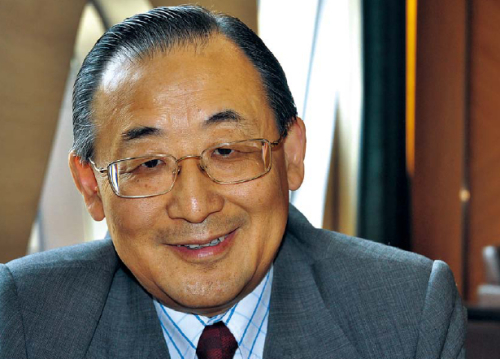UNESCO official says Korea an important player in global ‘education for all’ driveFor many developed countries, education was the key factor in propelling them out of the ashes of war and poverty and transform them into healthy economies.
“Education is the basis for everything,” said UNESCO Assistant Director General for Education Qian Tang during an exclusive interview with The Korea Herald.

Qian Tang, UNESCO’s assistant director general for education (Yoav Cerralbo/The Korea Herald)
The six goals of Education for All have become UNESCO’s overriding priority in education.
With a strong focus on Africa, UNESCO is working to expand early child care and education; provide free and compulsory primary education for all; promote learning and life skills for young people and adults; increase adult literacy by 50 percent; achieve gender equality by 2015; and improve the quality of education.
“It’s progressing well but in many developing countries, I’m afraid by the year 2015, many of them will not reach the six goals,” he said.
This is where UNESCO plays an important role with the help of cooperation from industrialized, middle income and new income countries.
“Countries like Korea help those countries that will not achieve those goals,” said Tang.
In its essence, UNESCO is a forum that teams countries together with the aim of achieving global peace and understanding.
To play its part in achieving this goal, Korea donated $1 million to five southern African countries through UNESCO in support of the agency’s technical vocational training.
“Skill development is what those African countries need for their economic development,” he said.
The cycle of poverty is one of the main factors preventing a country from offering educating for their young generations.
“This is our biggest concern in the UNESCO education efforts,” he said.
In the last 10 years UNESCO has improved the situation for out-of-school children, but the numbers are still alarming.
More than 67 million school aged children around the world are not in school. Some children are forced, due to poverty at home, to help their families by working either selling products on the streets or in shops, or tend to the family farm.
Yet those are the luckier ones. Other children are forced to work as child laborers in sweatshops or sold into human trafficking.
“There are many factors like poverty and also, more than half of these out-of-school children are girls,” he said. “They are discriminated against and are not the priority of the country, so they stay home and help the family. Also, there’s a problem with child labor.”
But there has been improvement noted Tang.
In the last few years, many countries have taken political measures ― making primary education mandatory.
Other special measures include abolishing primary school fees and providing free lunches for students.
Vocational training for teachers is also an important factor to help them deal with the sudden increase of students.
“With the help of the international community, countries like Kenya increased their enrollment of primary school students from 60 percent to 90 percent.
“If the government has political will, with the help of the international community, then they can achieve positive change,” he said.
Tang added that the Korean experience can be taught to other countries to help them achieve universalized primary education.
Illiteracy is another challenge that UNESCO is tackling. Out of the 800 million illiterate people in the world, 66 percent are women.
“This is a tough fight because some of these people live in remote areas and are part of ethnic groups that are discriminated against by the majority.”
But the biggest challenge, Tang added, comes from governments who do not place the fight against illiteracy high on their agenda because it does not achieve fast political results.
“UNESCO will help them achieve quick literacy results and some literacy programs aren’t very expensive,” Tang noted.
The positive promotion of multiculturalism is also another primary concern of UNESCO.
UNESCO’s Asia-Pacific Centre of Education for International Understanding assists the United Nation’s agency in promoting peace and international understanding.
With APCEIU’s head office in Seoul, the category II institute works to tear down barriers that might arise from migration, religion and different cultures.
“People need to learn to understand each other, tolerate each other, peacefully coexist, and live together,” Tang said. “This is a very important educational function.”
Overall, global wealth grew fastest in the Asia-Pacific region last year, according to a new report by Boston Consulting Group, but illiteracy in the region is the highest in the world.
“The political systems are different, so it’s more important for this region to promote international understanding,” he said. “It is more meaningful than other areas.”
By Yoav Cerralbo (
yoav@heraldcorp.com)





![[KH Explains] How should Korea adjust its trade defenses against Chinese EVs?](http://res.heraldm.com/phpwas/restmb_idxmake.php?idx=645&simg=/content/image/2024/04/15/20240415050562_0.jpg&u=20240415144419)
